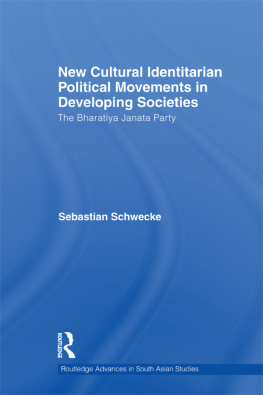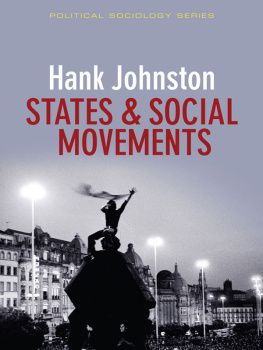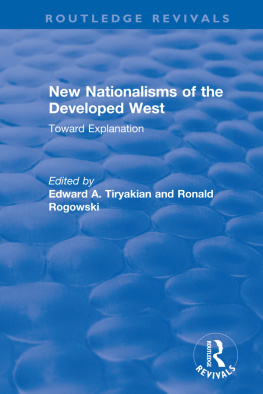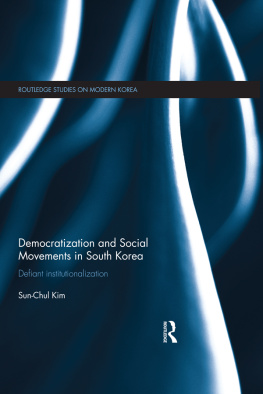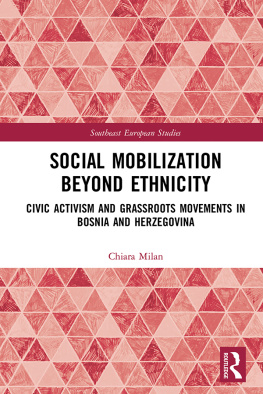New Cultural Identitarian Political Movements in Developing Societies
Applying an intercultural and comparative theoretical approach across Asia and Africa, this book analyses the rise and moderation of political movements in developing societies which mobilise popular support with references to conceptions of cultural identity. The author includes not only the Hindu nationalist movement but also many Islamist political movements in a single category New Cultural Identitarian Political Movements (NCIPM). Demonstrating significant similarities in the pattern of evolution between these and European Christian Democracy, the book provides an instrument for the analysis of these movements outside the parameters of the fundamentalism debate.
The book looks at a number of key variables for understanding the evolution of NCIPM, and it goes on to analyse the transition of developing societies from rent-based political economies to capitalism and the (partial) failure of this transition process. It argues that there is a need to incorporate economic and class analysis in the study of political processes in developing societies against the continuing emphasis on cultural factors associated with the cultural turn of social sciences. The book is an interesting contribution to studies in South Asian Politics, as well as Comparative Politics.
Sebastian Schwecke teaches South Asian Politics at the Centre for Modern Indian Studies (CeMIS), University of Gttingen, Germany.
Routledge advances in South Asian studies
Edited by Subrata K. Mitra
South Asia Institute, University of Heidelberg, Germany
South Asia, with its burgeoning, ethnically diverse population, soaring economies, and nuclear weapons, is an increasingly important region in the global context. The series, which builds on this complex, dynamic and volatile area, features innovative and original research on the region as a whole or on the countries. Its scope extends to scholarly works drawing on history, politics, development studies, sociology and economics of individual countries from the region as well those that take an interdisciplinary and comparative approach to the area as a whole or to a comparison of two or more countries from this region. In terms of theory and method, rather than basing itself on any one orthodoxy, the series draws broadly on the insights germane to area studies, as well as the tool kit of the social sciences in general, emphasising comparison, the analysis of the structure and processes, and the application of qualitative and quantitative methods. The series welcomes submissions from established authors in the field as well as from young authors who have recently completed their doctoral dissertations.
1 Perception, Politics and Security in South Asia
The compound crisis of 1990
P. R. Chari, Pervaiz Iqbal Cheema and Stephen Philip Cohen
2 Coalition Politics and Hindu Nationalism
Edited by Katharine Adeney and Lawrence Saez
3 The Puzzle of Indias Governance
Culture, context and comparative theory
Subrata K. Mitra
4 Indias Nuclear Bomb and National Security
Karsten Frey
5 Starvation and Indias Democracy
Dan Banik
6 Parliamentary Control and Government Accountability in South Asia
A comparative analysis of Bangladesh, India and Sri Lanka
Taiabur Rahman
7 Political Mobilisation and Democracy in India
States of emergency
Vernon Hewitt
8 Military Control in Pakistan
The parallel state
Mazhar Aziz
9 Sikh Nationalism and Identity in a Global Age
Giorgio Shani
10 The Tibetan Government-in-Exile
Politics at large
Stephanie Roemer
11 Trade Policy, Inequality and Performance in Indian Manufacturing
Kunal Sen
12 Democracy and Party Systems in Developing Countries
A comparative study
Clemens Spiess
13 War and Nationalism in South Asia
The Indian state and the Nagas
Marcus Franke
14 The Politics of Social Exclusion in India
Democracy at the crossroads
Edited by Harihar Bhattacharyya, Partha Sarka and Angshuman Kar
15 Party System Change in South India
Political entrepreneurs, patterns and processes
Andrew Wyatt
16 Dispossession and Resistance in India
The river and the rage
Alf Gunvald Nilsen
17 The Construction of History and Nationalism in India
Textbooks, controversies and politics
Sylvie Guichard
18 Political Survival in Pakistan
Beyond ideology
Anas Malik
19 New Cultural Identitarian Political Movements in Developing Societies
The Bharatiya Janata Party
Sebastian Schwecke
First published 2011
by Routledge
2 Park Square, Milton Park, Abingdon, Oxon OX14 4RN
Simultaneously published in the USA and Canada
by Routledge
711 Third Avenue, New York, NY 10017
Routledge is an imprint of the Taylor & Francis Group, an informa business
2011 Sebastian Schwecke
Typeset in Times by Wearset Ltd, Boldon, Tyne and Wear
All rights reserved. No part of this book may be reprinted or reproduced or utilised in any form or by any electronic, mechanical, or other means, now known or hereafter invented, including photocopying and recording, or in any information storage or retrieval system, without permission in writing from the publishers.
British Library Cataloguing in Publication Data
A catalogue record for this book is available from the British Library
Library of Congress Cataloging in Publication Data
Schwecke, Sebastian.
New cultural identitarian political movements in developing societies: the Bharatiya Janata Party/Sebastian Schwecke.
p. cm. (Routledge advances in South Asian studies; 19)
Includes bibliographical references and index.
1. Bharatiya Janata Party. 2. Group identityPolitical aspectsIndia. 3. IndiaPolitics and government1977 4. IndiaEthnic relationsPolitical aspects. I. Title.
JQ298.B55S39 2011
324.254083dc22
2010027554
ISBN13: 978-0-415-59596-4 (hbk)
ISBN13: 978-0-203-83390-2 (ebk)

